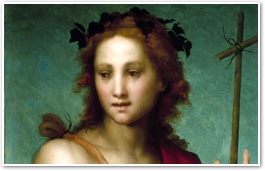The force of habit
- JOHN HENRY CARDINAL NEWMAN
We must consider the force of habit.
 Conscience at first warns us against sin; but if we disregard it, it soon ceases to upbraid us; and thus sins, once known, in time become secret sins. It seems then (and it is a startling reflection), that the more guilty we are, the less we know it; for the oftener we sin, the less we are distressed at it. I think many of us may, on reflection, recollect instances, in our experience of ourselves, of our gradually forgetting things to be wrong which once shocked us. Such is the force of habit.
Conscience at first warns us against sin; but if we disregard it, it soon ceases to upbraid us; and thus sins, once known, in time become secret sins. It seems then (and it is a startling reflection), that the more guilty we are, the less we know it; for the oftener we sin, the less we are distressed at it. I think many of us may, on reflection, recollect instances, in our experience of ourselves, of our gradually forgetting things to be wrong which once shocked us. Such is the force of habit.
By it (for instance) men contrive to allow themselves in various kinds of dishonesty. They bring themselves to affirm what is untrue, or what they are not sure is true, in the course of business. They overreach and cheat; and still more are they likely to fall into low and selfish ways without their observing it, and all the while to continue careful in their attendance on the Christian ordinances, and bear about them a form of religion. Or, again, they will live in self-indulgent habits; eat and drink more than is right; display a needless pomp and splendor in their domestic arrangements, without any misgiving; much less do they think of simplicity of manners and abstinence as Christian duties.
Now we cannot suppose they always thought their present mode of living to be justifiable, for others are still struck with its impropriety; and what others now feel, doubtless they once felt themselves. But such is the force of habit.
So again, to take as a third instance, the duty of stated private prayer; at first it is omitted with compunction, but soon with indifference. But it is not the less a sin because we do not feel it to be such. Habit has made it a secret sin. To think of these things, and to be alarmed, is the first step towards acceptable obedience; to be at ease, is to be unsafe. We must know what the evil of sin is hereafter, if we do not learn it here. God give us all grace to choose the pain of present repentance before the wrath to come!
 This is Meaghen Gonzalez, Editor of CERC. I hope you appreciated this piece. We curate these articles especially for believers like you.
This is Meaghen Gonzalez, Editor of CERC. I hope you appreciated this piece. We curate these articles especially for believers like you.
Please show your appreciation by making a $3 donation. CERC is entirely reader supported.

Acknowledgement
 John Henry Cardinal Newman. "The force of habit." excerpt from Parochial and Plain Sermons (San Francisco: Ignatius Press, 1997).
John Henry Cardinal Newman. "The force of habit." excerpt from Parochial and Plain Sermons (San Francisco: Ignatius Press, 1997).
Rreprinted with permisison.
The Author

 Blessed John Henry Newman was born on 21 February 1801, and died on 11 August 1890. Through his published writings and private correspondence he created a greater understanding of the Catholic Church and its teachings, helping many persons with their religious difficulties. At his death he was praised for his unworldliness, humility, and prayerful contact with the invisible world. Blessed John Henry Cardinal Newman is the author of many books including, Parochial and Plain Sermons, Essay on the Development of Christian Doctrine, An Essay in Aid of a Grammar of Assent, Difficulties of Anglicans, The Idea of a University, Fifteen Sermons Preached Before the University of Oxford Between A.D. 1826 and 1843, and Apologia Pro Vita Sua.
Blessed John Henry Newman was born on 21 February 1801, and died on 11 August 1890. Through his published writings and private correspondence he created a greater understanding of the Catholic Church and its teachings, helping many persons with their religious difficulties. At his death he was praised for his unworldliness, humility, and prayerful contact with the invisible world. Blessed John Henry Cardinal Newman is the author of many books including, Parochial and Plain Sermons, Essay on the Development of Christian Doctrine, An Essay in Aid of a Grammar of Assent, Difficulties of Anglicans, The Idea of a University, Fifteen Sermons Preached Before the University of Oxford Between A.D. 1826 and 1843, and Apologia Pro Vita Sua.




